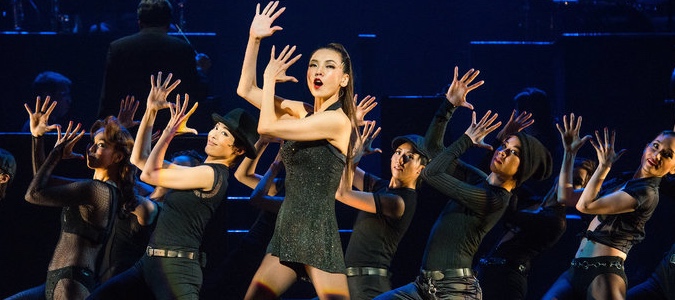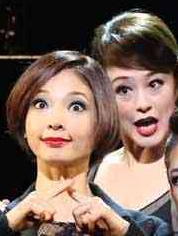

Takarazuka Chicago
Opening Night: July 20, 2016
Closing: July 24, 2016
Theater: David H. Koch Theater
Experience the show-stopping glamour, eye-catching costumes, and gender-bending fun that draws 2.5 million audience members annually to performances by Japan’s Takarazuka Revue. Started by a railway magnate in 1914 to attract tourists to the hot springs town of Takarazuka, the all-female Takarazuka Revue has grown into a true cultural phenomenon, with a devoted fan base that clamors for the company’s sparkling adaptations of classic Western and Japanese stories, movies, and plays, and a cultural influence that extends into the realms of anime and manga.
BUY TICKETSREAD THE REVIEWS:
July 21, 2016
Do the Japanese have an expression similar to the British one, noting the folly of bringing coals to Newcastle? Maybe something about bringing a tuna fish sandwich to a sushi bar? That question arose during a performance by the celebrated all-female Japanese theater company Takarazuka on Wednesday night, a presentation of the Lincoln Center Festival at the David H. Koch Theater. The evening concluded, as all this company’s productions do, with a splashy, dizzyingly odd encore, this one lasting well over 15 minutes and including the old Frank Sinatra standard “That’s Life,” among other surrealities. But the show that preceded it was “Chicago,” the musical that has been playing for more than 20 years on Broadway. I’ll confess to some disappointment going in, since I had read about the company and heard glowing reports from friends about its dazzling spectacles and ample repertoire, which includes many other Broadway musicals but also adaptations of classic novels (“Gone With the Wind”!), operas, Shakespeare plays and movies (“Bonnie and Clyde”!). “Chicago,” with its first-rate score by John Kander and Fred Ebb and stiletto-sharp book by Ebb and Bob Fosse, is a great musical, but for theater-loving New Yorkers, it’s not exactly a novelty. My heart sank a little further when I entered the theater to see a gleaming gold proscenium looming above the stage — to knowing eyes, the signature scenic device of the City Center Encores! series. Yes, this is not a fresh take on the musical, an original production, but a virtual facsimile of the one playing a dozen or so blocks downtown, with similar slinky black costumes (by William Ivey Long), the same onstage band contained in a gold-rimmed box (the minimalist sets are by John Lee Beatty), and essentially the same direction (by Walter Bobbie) and choreography (by Ann Reinking, after Bob Fosse’s original). True, it’s performed in Japanese, but this novelty doesn’t bring any new zest to the material, and actually drains some of its cackling wit, since reading Ebb’s scabrous, cynical lyrics does not have the same sucker-punch quality of hearing them sung. And, yes, female performers play the male roles with remarkable verisimilitude. (The rigorously trained Takarazuka performers are divided into specialists in male or female roles, although they can move camps.) But “Chicago” is dominated by its two female leads, the scheming murderers Velma Kelly (Yoka Wao) and Roxie Hart (Hikaru Asami). The significant male roles are but two: the self-regarding lawyer Billy Flynn (Saori Mine) and Roxie’s dupe of a husband, Amos Hart (Chihiro Isono). All that said, I’m happy to praise the performance as a thoroughly polished, well sung and dramatically pert presentation of material I am mightily familiar with, having seen the Broadway revival probably 10 times over the years. Ms. Wao, with her lithe body, long stems and swinging ponytail, makes for an arresting presence as Velma, seething in irritation as she is forever being outmaneuvered by her rival for Billy Flynn’s services, Roxie. As this more skillful schemer, who shot her lover but manages to sweet-talk her husband into coming to her defense, Ms. Asami puts on and removes her facade of innocence with bright comic ingenuity. Ms. Isono’s Amos captures the bumbling pathos of her character nicely in her single solo number, “Mr. Cellophane.” And Ms. Mine all but steals the show in a dazzling turn as Billy Flynn, exuding suaveness, cynicism and sex appeal in equal measures, and singing in a contralto that sounds convincingly, if not eerily, masculine. The highlight of the production, in fact, is the rousing comic number “We Both Reached for the Gun,” in which Roxie sits on Billy’s knee and is manipulated like a ventriloquist’s dummy. Ms. Mine’s voice leaps between Billy’s smooth pseudo-baritone and a bright squeak representing Roxie’s dictated responses with breathtaking ease, making the number even more of a tour de force than it usually is. In the supporting roles, Jun Hatsukaze gleamed with opportunistic malice as the jail matron Mama Morton, and, in a break with Takarazuka tradition, the role of the sob sister journalist Mary Sunshine was played by (nonspoiler alert) a man, T. Okamoto, possessed of a nice operatic trill. Although the Takarazuka performers are famously well drilled in all aspects of performance, connoisseurs of the Fosse style probably will not emerge dazzled by their mastery of his work. While they certainly thrust their hips with gusto, snap their wrists and strike the right jagged poses, the effect is nevertheless a bit like Fosse doused in fabric softener. (And, unfortunately, Ms. Asami experienced cartwheel-fail in the climactic “Hot Honey Rag.”) For me, the fun really started when the musical was over, and the cast had taken its bows. The company then re-emerged, in front of a glittering Art Nouveau swirl of a set piece, to perform a supersize, Las Vegas-flavored encore. This encompassed a full nine different songs, and included Rockettes-style high kicking, a tango and such original numbers as “Glory to Be Takarasiennes” and “Takarazuka, Home in My Heart.” I cannot claim that, with “Chicago,” the company took up residence in mine. For that, I expect I will have to visit the company at its hometown base in the city that gives it its name, to see some of its more exotic repertoire. “The Rose of Versailles” or “Passion: Jose and Carmen” or even — why not? — “An Officer and a Gentleman.”
READ THE REVIEW


















